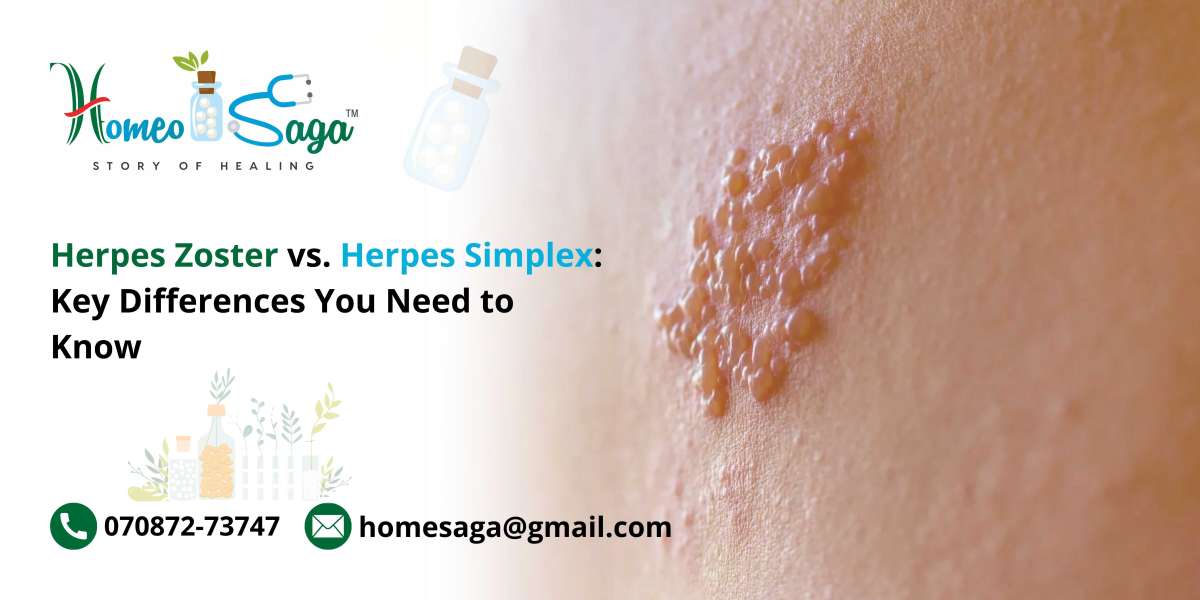In the realm of viral infections, Herpes Zoster vs. Herpes Simplex are two terms that often come up, but many people may not fully understand their differences. While both belong to the herpesvirus family, they have distinct characteristics, symptoms, and treatment options. This article aims to clarify the key differences between Herpes Zoster and Herpes Simplex, helping you navigate these conditions more effectively.
Defining the Viruses
Herpes Zoster, also known as shingles, is caused by the reactivation of the varicella-zoster virus (VZV), the same virus responsible for chickenpox. After a person recovers from chickenpox, the virus lies dormant in the nerve roots and can reactivate years later, leading to shingles.
Herpes Simplex, meanwhile, encompasses two types of viruses: Herpes Simplex Virus type 1 (HSV-1) and type 2 (HSV-2). HSV-1 is commonly associated with oral herpes, leading to cold sores, while HSV-2 is primarily linked to genital herpes. Both types can be transmitted through direct contact with an infected person.
Symptoms to Identify
Understanding the symptoms of these infections is crucial for diagnosis and treatment.
Symptoms of Herpes Zoster
- Pain and Sensitivity: Initial symptoms often include localized pain, tingling, or burning in a specific area, typically on one side of the body.
- Rash Development: A rash appears a few days after the onset of pain, forming fluid-filled blisters that eventually crust over.
- Systemic Symptoms: Fever, headache, and fatigue may accompany the rash.
Symptoms of Herpes Simplex
- HSV-1: This type primarily results in cold sores or fever blisters around the mouth, often accompanied by itching or a tingling sensation before the blisters appear.
- HSV-2: This variant leads to painful blisters in the genital area, along with symptoms like itching, discomfort, and flu-like signs during initial outbreaks.
How They Spread
The transmission of these viruses is another critical distinction.
Herpes Zoster Transmission
Herpes Zoster itself isn’t contagious in the way that other infections are. However, if someone who has never had chickenpox comes into contact with the fluid from shingles blisters, they can contract chickenpox, not shingles.
Herpes Simplex Transmission
Herpes Simplex is highly contagious. It spreads easily through skin-to-skin contact, including kissing or sexual intercourse, and can also be transmitted through sharing personal items like utensils or towels.
Treatment Options
Both conditions have effective treatment options, but they differ.
Treatment for Herpes Zoster
The primary treatment for Herpes Zoster involves antiviral medications such as acyclovir, valacyclovir, or famciclovir. These medications can help reduce the severity and duration of symptoms if administered early. Pain relief is also essential, often requiring over-the-counter pain relievers or prescription medications for more severe discomfort.
Treatment for Herpes Simplex
For Herpes Simplex, antiviral medications are similarly effective. Acyclovir, valacyclovir, and famciclovir can help manage outbreaks and reduce the frequency of recurrences. Topical treatments may also provide symptomatic relief for cold sores.
Preventive Measures
Prevention strategies vary between the two infections.
Preventing Herpes Zoster
Vaccination is an effective way to prevent Herpes Zoster. The shingles vaccine is recommended for adults over 50 to reduce the risk of developing shingles and its complications.
Preventing Herpes Simplex
To prevent Herpes Simplex, it’s crucial to avoid direct contact with active sores. Using barrier methods during sexual activity and practicing good hygiene can significantly reduce the risk of transmission.
Conclusion
In summary, while Herpes Zoster vs. Herpes Simplex may share the herpes name, they are distinct conditions with unique symptoms, causes, and treatment options. Understanding the differences between Herpes Zoster vs. Herpes Simplex is vital for effective prevention and management. If you suspect you have either condition, it’s important to seek medical advice for an accurate diagnosis and appropriate treatment. With the right knowledge and care, you can effectively manage these viral infections and maintain your health.








